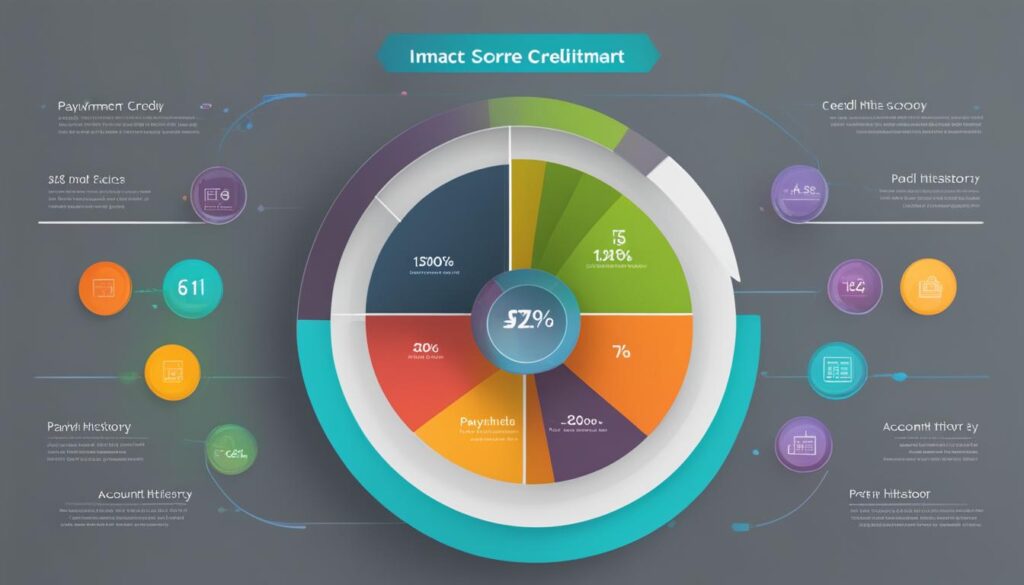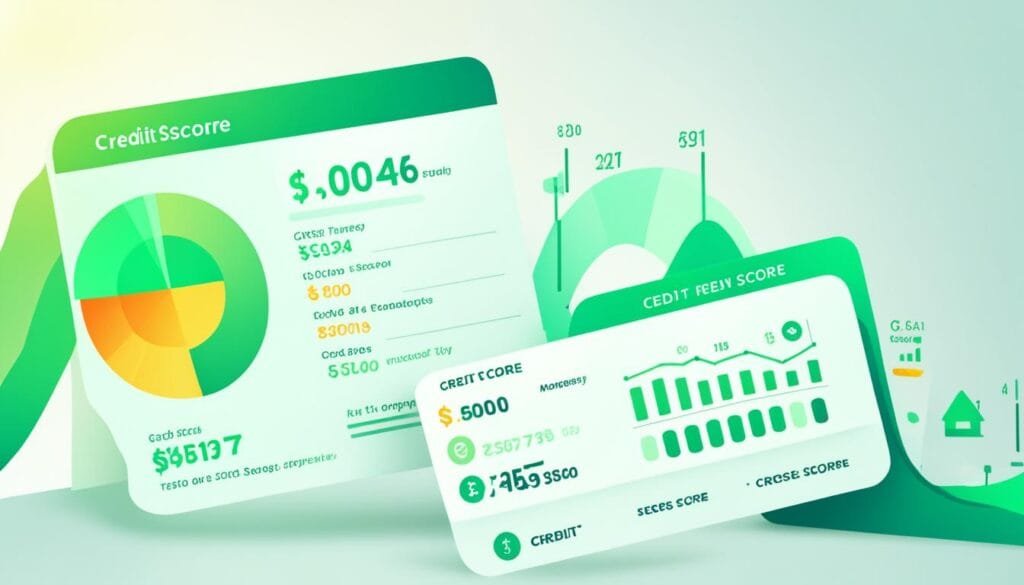Having a good credit score is essential for financial well-being. It affects your ability to secure loans, get lower interest rates, and even rent an apartment. But there are many common misconceptions when it comes to credit scores that can lead to poor financial decisions. Let’s debunk some of these myths and gain a better understanding of how credit scores really work.
Imagine this: Sarah, a young professional, is excited to apply for her first credit card. She has heard from friends and family that checking her credit score will negatively impact it. Worried about hurting her chances of approval, she hesitates to check her score. As a result, she misses out on valuable information that could help her build a strong credit history.
As Sarah’s story highlights, there are plenty of credit score myths floating around that can hinder our financial progress. It’s essential to separate fact from fiction and arm ourselves with accurate knowledge to make informed decisions.
In this article, we will debunk some of the most common credit score myths and provide you with the tools to navigate the credit landscape more confidently. Let’s get started!
Key Takeaways:
- Checking your own credit score is considered a “soft pull” and does not lower your score.
- Carrying a balance on your credit card does not boost your credit score, it may actually harm it.
- Your income does not directly affect your credit score. Factors such as payment history and credit utilization have a greater impact.
- A good credit score does not mean you are rich, but it does demonstrate creditworthiness.
- While a perfect credit score may not provide additional benefits, having a high score can unlock better financial opportunities.
Myth 1: Checking my credit score lowers my credit score
One common misconception that many people have is that checking their own credit score can actually lower their credit score. However, this is not true. In fact, checking your own credit score is considered a “soft pull” and does not have any negative impact on your credit.
Unlike a “hard pull” which occurs when a lender or creditor checks your credit as part of a loan application or credit card application, a soft pull does not affect your credit score. Soft pulls are typically done by individuals to monitor their own credit or by companies conducting background checks or pre-screening for offers.
It is important to note that while checking your own credit score is harmless, you should be cautious when allowing others to pull your credit. Multiple hard inquiries within a short period of time can have a negative impact on your credit score.
To ensure that you can monitor your own credit score without any negative repercussions, you can use credit monitoring services. These services allow you to regularly track your credit score and receive alerts for any changes or suspicious activities.
Benefits of Credit Monitoring
- Early detection: Credit monitoring allows you to be proactive in detecting any fraudulent activity or errors on your credit report. By identifying and addressing these issues early on, you can minimize potential damage to your credit score.
- Building credit: Monitoring your credit score regularly can help you understand how your financial habits and decisions impact your score. By staying informed, you can make more informed choices to improve your creditworthiness and build a positive credit history.
- Tracking progress: Credit monitoring services often provide access to credit score trends and historical data. This enables you to track your progress over time and celebrate milestones as your credit score improves.
By debunking this common credit score myth, you can confidently check your credit score without worrying about any negative consequences. Remember, understanding how credit scores work and taking proactive steps to monitor and improve your credit can lead to better financial opportunities in the future.
Soft Pull vs. Hard Pull
| Soft Pull | Hard Pull |
|---|---|
| Checking your own credit score | Loan or credit application |
| Credit monitoring | Mortgage application |
| Background checks | Credit card application |
Myth 2: Carrying a balance on my credit card boosts my credit score
One common misconception about credit scores is the belief that carrying a balance on your credit card can help improve your credit score. However, this is not true. In fact, carrying a balance can actually have a negative impact on your credit score.
When you carry a balance on your credit card, it increases your credit utilization rate. Your credit utilization rate is the percentage of your available credit that you are currently using. It is calculated by dividing your credit card balance by your credit limit. A high credit utilization rate can signal to lenders that you may be relying too heavily on credit, which can lower your credit score.
To maintain a healthy credit score, it is best to pay off your credit card balance in full each month. This demonstrates responsible credit management and keeps your credit utilization rate low. By paying off your credit card debt, you can also avoid costly interest charges and fees.
Understanding Credit Utilization Rate
Credit utilization rate is an important factor in determining your credit score. It accounts for approximately 30% of your overall score, making it a significant factor to consider in credit management.
It is recommended to keep your credit utilization rate below 30%. This means that if you have a credit card with a $1,000 limit, you should aim to keep your balance below $300.
By keeping your credit utilization rate low, you demonstrate to lenders that you are a responsible borrower who can manage credit effectively. This can improve your creditworthiness and increase your chances of being approved for future credit applications.

Carrying a balance on your credit card may seem like a convenient way to manage your finances, but it does not benefit your credit score in the long run. Paying off your credit card debt in full each month is the best way to maintain a healthy credit score and financial well-being.
Myth 3: My income impacts my credit score
Contrary to popular belief, your income does not directly impact your credit score. While your income plays a crucial role in your overall financial well-being, it is not a factor considered in credit scoring models. Instead, credit scoring models primarily focus on various other credit score factors to assess your creditworthiness.
The key factors that influence your credit score include:
- Payment History: This refers to the timely payments you make on your credit accounts, such as loans and credit cards.
- Credit Utilization: This is the percentage of your available credit that you are currently using. It is generally recommended to keep your credit utilization below 30% to maintain a healthy credit score.
- Length of Credit History: The length of time you have had credit accounts also contributes to your credit score. Generally, a longer credit history can positively impact your score.
- New Credit: Opening several new credit accounts within a short period can potentially indicate increased credit risk.
- Credit Mix: Having a diverse mix of credit types, such as credit cards, mortgages, and loans, can positively impact your credit score.
While your income may indirectly influence your ability to manage credit, it does not play a direct role in credit scoring. It is essential to focus on maintaining a positive payment history, keeping credit utilization low, and managing your credit responsibly to achieve a favorable credit score.

Myth 4: A good credit score means you’re rich
Having a good credit score does not necessarily mean you are rich. It is simply an indication that you are a good credit risk and have a history of responsible financial behavior. Your salary does not directly impact your credit score, but it may influence credit limits on certain cards.
Contrary to popular belief, a good credit score is not a reflection of your wealth or income level. It is a measure of your creditworthiness and your ability to manage credit responsibly. Lenders use your credit score to assess the risk of lending to you and determine the terms of your credit.
While a high salary may provide you with the means to pay your bills and debts, it does not guarantee good credit. Your credit score is determined by factors such as your payment history, credit utilization, length of credit history, and credit mix. These factors are used to assess your creditworthiness, regardless of your income.
However, it’s worth noting that your income may have an impact on the credit limits you are offered on certain credit cards. Lenders may consider your income when determining the maximum credit limit they are willing to extend to you. This can be advantageous for individuals with high salaries, as they may have access to higher credit limits.
It’s essential to understand that your credit score is a reflection of your financial habits and credit management, not your income level. By maintaining a good credit score, you demonstrate to lenders that you are a reliable borrower, regardless of your wealth.
Myth 5: A perfect credit score doesn’t really matter
Some people believe that having a perfect credit score doesn’t really matter. After all, once your credit score is already good, why bother striving for perfection? However, while a perfect credit score may not provide any additional benefits, it’s important to understand the significant advantages of having a score above a certain threshold, such as 760 or above.
Qualifying for the Best Deals
One of the key benefits of having a perfect credit score is qualifying for the best deals on various financial products. Lenders consider individuals with excellent credit scores to be low-risk borrowers, which makes them eligible for preferential interest rates, higher credit limits, and better terms and conditions on loans, mortgages, and credit cards. With a perfect credit score, you can access financial products with lower interest rates, potentially saving you thousands of dollars over time.
Unlocking Lower Interest Rates
When you have a high credit score, lenders are more likely to offer you lower interest rates on loans and credit cards. This means you’ll pay less in interest charges over the life of the loan or when carrying a balance on your credit card. Whether you’re planning to buy a car, a home, or simply need a personal loan, a perfect credit score can help you secure lower interest rates, potentially saving you a significant amount of money.
Greater Negotiating Power
With a perfect credit score, you have stronger negotiating power when it comes to financial transactions. Whether you’re refinancing your mortgage, negotiating a business loan, or applying for a line of credit, having a stellar credit score gives you leverage in negotiations. Lenders are more likely to value your business and provide you with more favorable terms if they see that you have a flawless credit history.
| Credit Score Range | Credit Rating | Qualification for Best Deals |
|---|---|---|
| 800 – 850 | Excellent | Highly likely |
| 740 – 799 | Very Good | Likely |
| 670 – 739 | Good | Possible |
| 580 – 669 | Fair | Limited |
| 300 – 579 | Poor | Unlikely |
As illustrated in the table above, credit scores within certain ranges can determine your qualification for the best deals. While a perfect credit score is not necessary, a higher score within the Excellent or Very Good range significantly increases your chances of qualifying for the most favorable terms.
It’s important to remember that achieving a perfect credit score requires responsible financial habits, including making payments on time, keeping credit card balances low, and avoiding unnecessary credit inquiries. Striving for a high credit score not only establishes financial stability but also opens doors to better opportunities in the world of lending and personal finance.
How Do Common Credit Score Myths Impact Insurance Premiums?
Many people are unaware of the significant impact of credit on premiums. Common credit score myths can lead to misunderstandings about how insurance rates are determined. In reality, a lower credit score can result in higher premiums for auto, home, and life insurance policies. It’s important to understand the connection between credit and insurance costs.
Conclusion
Understanding credit scores is essential for managing your finances effectively and making informed decisions. By debunking common credit score myths and grasping the factors that truly impact your score, you can take control of your financial future.
To improve your credit score, it’s crucial to monitor it regularly. Keeping an eye on any changes or discrepancies allows you to respond promptly and address any potential issues. Additionally, paying off debts in a timely manner demonstrates responsible credit management and contributes positively to your creditworthiness.
Remember, your credit score is a reflection of your financial habits and responsible behavior. Taking steps to responsibly manage your credit, such as keeping credit utilization low and making payments on time, will significantly improve your score over time.
By understanding credit scores and implementing smart credit score tips, you can not only raise your credit score but also unlock better financial opportunities. Whether it’s getting approved for a mortgage, securing a low-interest rate on a loan, or qualifying for premium credit cards, a higher credit score opens doors to a world of possibilities.
FAQ
Does checking my credit score lower my credit score?
No, checking your own credit score is considered a “soft pull” and does not negatively impact your score. However, be cautious when others pull your credit, as it can lead to inquiries that may lower your score. Monitoring your score regularly can be beneficial for building credit.
Does carrying a balance on my credit card boost my credit score?
No, carrying a balance on your credit card can actually increase your credit utilization rate, which can negatively impact your score. It is best to pay off your credit card balance in full each month to maintain a healthy credit score.
Does my income impact my credit score?
No, your income does not directly impact your credit score. Credit scoring models primarily consider factors such as payment history, credit utilization, length of credit history, new credit, and credit mix when calculating your score.
Does having a good credit score mean I’m rich?
No, having a good credit score simply indicates that you are a good credit risk and have a history of responsible financial behavior. Your salary does not directly impact your credit score, but it may influence credit limits on certain cards.
Does a perfect credit score matter?
While a perfect credit score may not provide any additional benefits, having a score above a certain threshold (such as 760 or above) can qualify you for the best deals on various financial products. It is important to strive for a high credit score to unlock these benefits.
How can I improve my credit score?
By monitoring your score, paying off debts, and practicing responsible credit management, you can improve your credit score and unlock better financial opportunities.

